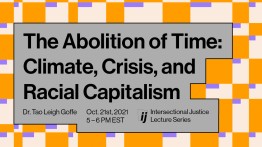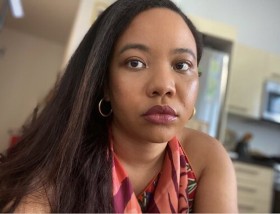The Abolition of Time: Climate, Crisis, and Racial Capitalism
Thursday, October 21, 2021, 5 - 6pm

What sorts of stories do we tell ourselves about race during times of apocalypse? Exploring contemporary forms of apocalyptic storytelling, Tao Leigh Goffe, Ph.D., assistant professor of literary theory and cultural history at Cornell University, considers time as officially ended.
Afrofuturist composer Sun Ra called for the abolition of time in his 1972 film Space Is the Place. “With the official end of time,” he said, “comes the end of a history that includes the African slavery and all the miseries of the dead.” To the entanglement of stolen land (the dispossession of Native sovereignty) and stolen life (African enslavement) in the Americas, Dr. Goffe adds a consideration of stolen time. Looking to HBO’s series Watchmen and Bong Joon-ho’s Parasite, she reflects on how colonial time scripts race during times of crisis. In doing so, she examines the scripting of the timeline of racial capitalism and how climate crisis is entangled with colonialism.

Tao Leigh Goffe is a London born award-winning writer, curator, and DJ specializing in the narratives that emerge from histories of race, debt, and technology. Based in New York City, her work negotiates what it means for her to be a Black woman from the United Kingdom, and the haunted legacies of Atlantic crossings. She studied English literature at Princeton University before pursuing a Ph.D. at Yale University.
With Andrea Chung, Dr. Goffe is the 2021-2022 Artist-in-Residence at the University of Connecticut. Her research is rooted in literatures and theories of labor that center Black feminist engagements with Indigeneity and Asian diasporic racial formations. Much of her art and sound design practice explores what it means to be of Afro-Asian heritage and how Black and Asian are not necessarily mutually exclusive terms of identification.
Dr. Goffe's story was featured on Hulu’s Your Attention Please, Initiative 29. Committed to forming intellectual communities beyond institutions, she is the founder of the Dark Laboratory, an engine for the study of race, technology, and ecology through digital storytelling (virtual reality (VR) extended reality (XR)). Dr. Goffe is also the Executive Director of the Afro-Asia Group, an organization that centers the intersections of African and Asian diasporas.
This series is co-organized by the Office of Student Affairs and Nada Ayad, Associate Dean of HSS, as a continuation of a reading and discussion series for first-year students that was held as part of the Fall 2020 new student orientation. In the spirit of The Cooper Union mission, the Black Student Union and the Cooper Climate Coalition, along with several other Cooper students and faculty, were deeply involved in the articulation of the program as well as in contributing to the reading list and suggesting speakers.




